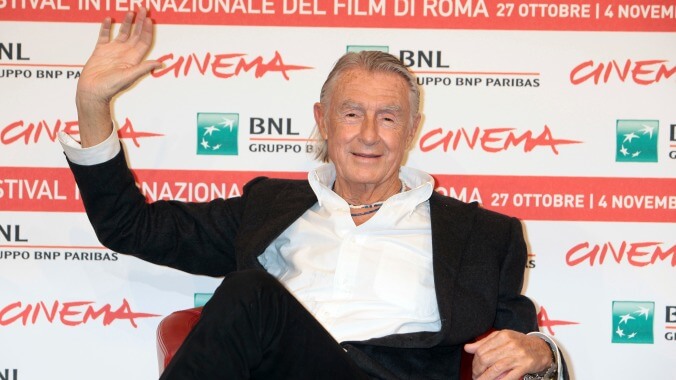R.I.P. Joel Schumacher, director of Batman Forever and The Lost Boys

Joel Schumacher, the film director whose background as a costume designer brought stylish, over-the-top flare to movies like The Lost Boys, St. Elmo’s Fire, Batman Forever, and Batman And Robin, has died. According to Variety, Schumacher died earlier today in New York City after a yearlong battle with cancer. He was 80.
Born in New York City, Schumacher was a star design student who worked designing clothes with Halston and dressing window displays for the city’s famed department stores before breaking into the movie industry as a costume designer on the 1972 Tuesday Weld/Anthony Perkins vehicle Play It As It Lays. He had some success in this arena, designing costumes for Stephen Sondheim and Neil Simon adaptations and two films by his friend Woody Allen—including the sci-fi caper Sleeper in 1973. By 1981, he leveled up into directing theatrical features, beginning with the sci-fi spoof The Incredible Shrinking Woman with Lily Tomlin.
He wrote his second film, D.C. Cab (1983), as a vehicle for Mr. T., but it would be his third feature, St. Elmo’s Fire (1985), that would become a generation-defining hit. He followed that film with the teen vampire flick The Lost Boys (1987), which similarly captured the zeitgeist of the ’80s—and not just because Schumacher was the first to pair up Corey Feldman and Corey Haim, showing his gift for spotting new talent. The commercial success of both films gave Schumacher A-list status, and he made a handful of other features, including the medical horror film Flatliners (1990) and the critically acclaimed Michael Douglas drama Falling Down (1993), before being handed the keys to the Batman franchise with Batman Forever in 1995.
Schumacher’s Batman films took the comic book aesthetics of Tim Burton’s Batman and Batman Returns and launched them into high-camp orbit, updating the good-natured goofiness of Burt Ward and Adam West for the ’90s with tongue firmly in cheek and nipples prominently placed on the Batsuit. Openly gay throughout his career, Schumacher was accused of adding a heavy dose of homoeroticism to the series—allegations he cheerfully confirmed in a 2006 interview with Barbara Walters, though he would later brush them off. By 2019, he claimed that the homoerotic element critics saw in his Batman had always been intrinsic to the character, saying, “There’s always been this thing about Batman and Robin being gay.”
But audiences weren’t quite ready for a kitschy, queer, latex-clad Batman in 1995. Batman Forever made a lot of money at the box office and racked up decent enough reviews, but its sequel, 1997’s Batman And Robin, was deemed both an artistic and a commercial failure upon its release, pulling in the lowest box office for a Batman film to date. (That’s relative, of course; the film still made $238 million worldwide.) This critical mockery, combined with vocal fan dissatisfaction, were enough to kill Schumacher’s plans for a third Batman movie, Batman Unchained, and he publicly apologized for Batman And Robin multiple times over the years.
For better or for worse, Schumacher never quite captured the same level of buzz around his post-Batman efforts, although he continued to work consistently up through the early 2010s. In between Batman films, he directed a pair of well-received John Grisham adaptations, The Client (1994) with Susan Sarandon and A Time To Kill (1996) with Matthew McConaughey, Sandra Bullock, and Samuel L. Jackson. Sarandon is the only actor to ever receive an Oscar nomination for her work in a Schumacher film, but he continued to attract A-list talent: He directed Nicolas Cage in 8MM (1999), Robert De Niro and Philip Seymour Hoffman in Flawless (1999), and Anthony Hopkins and Chris Rock in the largely forgotten Bad Company (2002).

 Keep scrolling for more great stories from The A.V. Club.
Keep scrolling for more great stories from The A.V. Club.